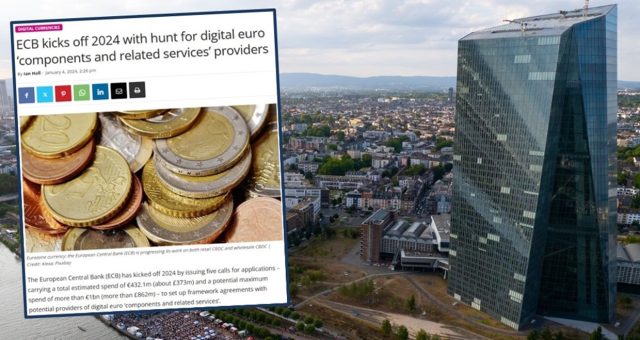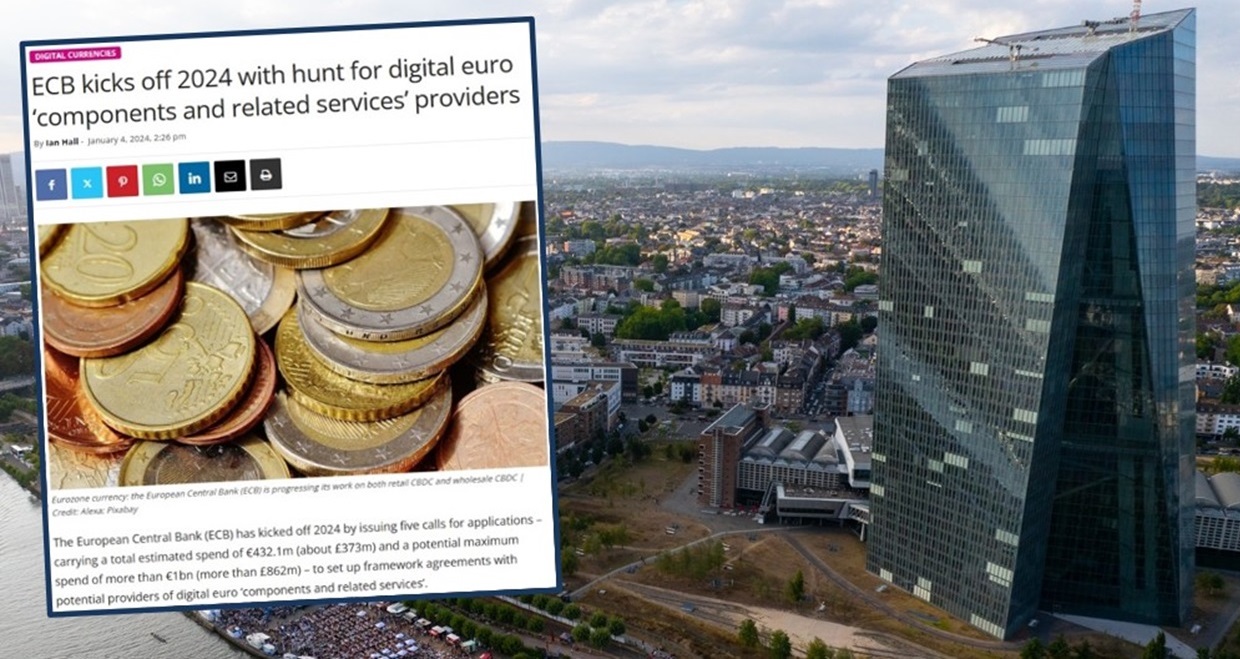 ECB headquarters: the Frankfurt-based authority’s potential work with the companies in the five different work areas covered by our article ‘include[s] safeguards allowing for the scope to be adjusted in line with changes to the legislation’ | Credit: Global Government Fintech article on the launch of the process on 4 January 2024 overlaid on a photo from the ECB
ECB headquarters: the Frankfurt-based authority’s potential work with the companies in the five different work areas covered by our article ‘include[s] safeguards allowing for the scope to be adjusted in line with changes to the legislation’ | Credit: Global Government Fintech article on the launch of the process on 4 January 2024 overlaid on a photo from the ECBThe European Central Bank (ECB) has announced the companies selected through a procurement process – launched almost two years ago – to provide ‘components and related services’ for the prospective digital euro.
In an announcement that will get champagne corks popping at the chosen companies, the Frankfurt-headquartered authority said that ‘as part of the preparation phase’ for the potential eurozone central bank digital currency (CBDC) the ‘first-ranked’ providers had been selected for ‘framework agreements’ in five fields of activity. The agreements, which effectively set the terms for potential future work, have a total estimated spend of €432.1m (about £377m) and a potential maximum spend of €1.164 billion (just over £1 billion).
The areas of activity and companies are: for ‘alias lookup’ – Sapient GmbH & Tremend Software Consulting S.R.L.; for ‘risk and fraud management’ – Feedzai; for ‘app and software development kit (SDK)’ – Almaviva and Fabrick; for ‘offline solution’ (the biggest chunk of work in respect of ECB spend) – Giesecke+Devrient (G+D); and for ‘secure exchange of payment information’ – Senacor FCS.
The announcement comes as a ‘two-year digital euro preparation phase’ focused on practical implementation and technical details wraps up this month (October). A decision on whether to actually issue a digital euro – a central bank digital currency (CBDC) for the 20-member eurozone – is contingent on the adoption of a legal framework.
RELATED ARTICLE ECB kicks off 2024 with hunt for digital euro ‘components and related services’ providers – a news story (4 January 2024) on the launch of the process
Five fields of work
The alias lookup work would facilitate payment transactions by users and intermediaries using simple aliases instead of long account numbers. The relevant framework’s estimated value (excluding VAT) is €27.9 million and maximum value is €55.8 million.
The fraud and risk management work would provide additional support for intermediaries (for example, commercial banks) in identifying fraudulent transactions. Its estimated value (excluding VAT) is €79.1 million and maximum value is €237.3 million.
The app and software development kit (SDK) component consists of a digital euro app and SDK to support intermediaries in the provision of digital euro services through their own apps and online interfaces. Its estimated value (excluding VAT) is €76.8 million and maximum value is €153.6 million.
The offline services component includes engineering and development services to provide an offline bearer payment instrument (a payment device that functions without an internet connection). The offline solution element carries the biggest projected spend (of the five areas) by some distance, with an estimated value (excluding VAT) of €220.7 million and maximum value of €662.1 million.
The secure exchange of payment information component supports the conversion of transactional information (for example, the amount of a transaction) and/or sensitive information (for example, the payment instrument used) into a secure form at the request of an intermediary. Its estimated value (excluding VAT) is €27.6 million and maximum value is €55.2 million.
In its relatively short announcement (‘ECB selects digital euro service providers’ – 2 October), the ECB also names a ‘second-ranked’ provider in four of the five areas, stating that these companies ‘will be approached only if required’. These companies are: equensWorldline (for alias lookup and also secure exchange of payment information); Capgemini Deutschland (for risk and fraud management) and Sapient GmbH & Tremend Software Consulting S.R.L (for app and SDK). The second-ranked offline services provider is to be announced ‘in due course.’
RELATED ARTICLE ECB’s Cipollone emphasises ‘autonomy and security’ of prospective digital euro – a news story on executive board member Piero Cipollone highlighting the prospective digital euro’s ability to “bolster Europe’s unity, safeguard our autonomy and strengthen our resilience” in a speech in Estonia earlier this week (29 September)
Minimum four years
An ECB announcement on the start of the procurement process in January 2024 explained that the Frankfurt-headquartered authority was looking to establish framework agreements ‘with the most suitable external providers to ensure that the Eurosystem is prepared to start developing a digital euro in the future if warranted.’ It also said that all frameworks were estimated to start in January 2025.
This week’s announcement similarly makes clear that the ‘actual development of the components – or parts thereof – will be decided at a later stage, subject to the ECB Governing Council’s decision on the potential next phase of the project.’
It also makes clear that framework agreements do not involve payments (to suppliers) ‘at this stage and include safeguards allowing for the scope to be adjusted in line with changes to the legislation.’
All frameworks will run for a minimum four years, with a maximum contract duration of 10 years – or, in two cases, 15 years.
The digital euro preparation phase (previously referred to as a ‘realisation phase’) follows a digital euro ‘investigation phase’ launched by the Eurosystem, which comprises the ECB and the national central banks of the 20 EU member states whose currency is the euro, in October 2021.
RELATED ARTICLE ECB announces 70 private-sector partners for digital euro ‘innovation platform’ – a news story (7 May 2025) on an ‘innovation platform’ (including a list of all participants) – see below
Private-sector support to date
Numerous external parties have already been engaged by the ECB on digital euro-related assignments – albeit with significantly lower spend.
For example, the ECB awarded framework contracts with five companies for digital euro consultancy (Accenture, BearingPoint, Deloitte Consulting, Oliver Wyman and Roland Berger) in November 2022.The consultancies’ framework agreements (which did not entail a definite financial commitment by the ECB towards any specific contractor) are running for four years, with a maximum of two annual extensions. The maximum spend is €20m across all contracts (so, €4m per consultancy if work were to end up being evenly diced).
These appointments followed the ECB’s selection of a different five companies (from 54 applications) to prototype digital euro user interfaces in September 2022: CaixaBank, which concentrated on peer-to-peer online payments; Worldline, which focused on peer-to-peer offline payments; the EPI (European Payments Initiative) company, which examined point-of-sale payments initiated by the payer; Nexi, which explored point-of-sale payments initiated by the payee; and Amazon, which focused on e-commerce payments. These five companies were not remunerated for their efforts and the ECB said there were no plans to re-use the prototypes in subsequent project phases.
Members of the European Parliament (MEPs) queried the selection of Amazon, expressing concerns including the company’s US roots and market dominance. In an appearance before a parliamentary committee in September 2022 then-ECB executive board member Fabio Panetta (now Banca d’Italia governor) mounted a sustained defence of the process and purpose of appointing the company, saying that the ECB was solely focused on learning about technological solutions and was not “making any deal on future co-operation.”
More recently, the ECB announced in May that it had been working with about 70 market participants through an ‘innovation platform’ to explore possible digital euro applications. In the past week it published a 41-page report (‘Digital euro innovation platform – Outcome report: pioneers and visionaries workstreams’ – 26 September) and announced a second round of experimentation.
Global Government Fintech‘s Digital Currencies topic section
Offline and anti-fraud solutions
The companies appointed to the newly announced five assignments have published their own announcements.
Munich-headquartered G+D highlighted that its appointment to deliver the offline solution was alongside partner companies Nexi and Capgemini.
‘The ability to pay offline, with no third-party involvement, is a key feature of the digital euro, which would ensure privacy and resilience as only cash does today,’ the company said in a press release.
‘Following the framework agreement conclusion, G+D and other successful tenderers will work with the ECB to finalise planning and timelines,’ its announcement continued. ‘Under the guidance of the ECB Governing Council and in line with EU legislation, this work will cover the design, integration and development of the Digital Euro Service Platform (DESP).’
Feedzai, a Portuguese-based company, similarly makes reference to another company, stating in an announcement that it would deliver – in partnership with subcontractor PwC – ‘a state-of-the-art central fraud detection and prevention mechanism, ensuring full compliance with EU security, privacy and data protection standards.’
The company describes its role as being ‘to contribute to safeguarding transactions from fraud by enriching payment service providers’ (PSPs) own risk management with insights derived from a central infrastructure-level view.’ It explains that ‘for every transaction, whether peer-to-peer (P2P) or peer-to-merchant (P2M), our platform will provide a fraud risk score that PSPs will use alongside their own controls when deciding whether to approve or decline a payment.’
*** JOIN GLOBAL GOVERNMENT FINTECH ON LINKEDIN ***
App and SEPI work
Almaviva and Fabrick are both Italian companies.
‘The app, designed to be intuitive and user-friendly, will be accessible via smartphone, tablet or smartwatch, offering all European Union [EU] citizens a uniform and secure experience for digital payments,’ Almaviva said. ‘The part of the project entrusted to the two Italian companies also includes the development of an infrastructure that will be open and interoperable thanks to dedicated SDKs [software development kits] and APIs [application programming interfaces – APIs], enabling European payment service providers [PSPs] to smoothly integrate their services with the digital euro platform.’
‘This approach will ensure widespread adoption of the new currency and foster innovation throughout the payments ecosystem, strengthening Europe’s technological autonomy,’ Almaviva added.
Senacor, a German company, highlighted its contract award in a LinkedIn post, describing ‘secure exchange of payment information’ (SEPI) as ‘the central token service of the digital euro service platform’ and explaining that this component ‘replaces sensitive payment information with secure tokens, so that the data does not need to be transmitted directly’.
‘A specialised expert team from Senacor, together with European cloud service providers, will drive the development of an advanced solution for SEPI,’ the company said.
